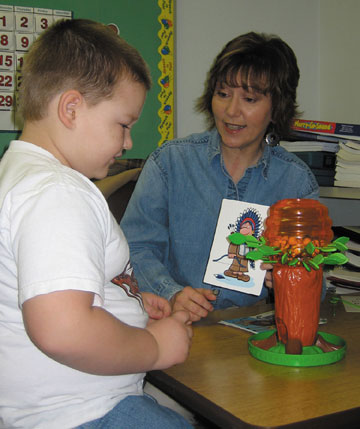
Keyton Klein
Special ed funding: It's more than 'just talk' for Keyton
By Patricia Bill
On Tammy Klein’s birthday, her son said, "I love you, Mommy."
"I don’t usually cry, but I did then," said Klein, who lives in Grygla, Minn.
They were tears of joy—and for good reason. Klein’s 6-year-old son, Keyton, has apraxia. It is a speech disorder, which caused him to be nonverbal. On Klein’s birthday, May 21, 2006, Keyton spoke those words for the first time.
Only a couple months before, Klein had testified to Minnesota legislators about special education and told them, "My dream is to one day hear my child say, ‘I love you, Mommy.’"
Special education funding made that dream a reality, said Klein. It provided early childhood special education, a paraprofessional, speech services, and an occupational therapy consultant to help Keyton.
Without intensive services, Keyton would not be where he is today, said Klein. From age 3, he used sign language, but he could say only about eight words. His birthday greeting to her was a breakthrough. Since then, the words have "just been flowing," Klein said. Now Keyton speaks in short sentences, and his verbal skills are expanding.
Klein describes her family as "fortunate" in their relationship with their local school district. "We have wonderful support here—the superintendent, principal, teacher, Head Start aide, and paraprofessional," she said.
She understands that circumstances may be different for families in other areas, she said. She has met parents at PACER workshops and trainings and in other settings who are struggling to obtain services for their children. Their situations remind her of her fear and frustration in Keyton’s early years when she sought help for her son and an agency said that he was not entitled to services. A call to PACER and help from a PACER staff advocate informed her about Keyton’s education rights and obtaining services.
Because of the services and the funds that provide them, "my world has completely changed," she said.
"The services made a difference in Keyton’s life. His para [paraprofessional] put on a note just this week that it is so awesome to see Keyton speaking to his friends," she said. "I always prayed that one day he would talk—and now he’s doing it."
